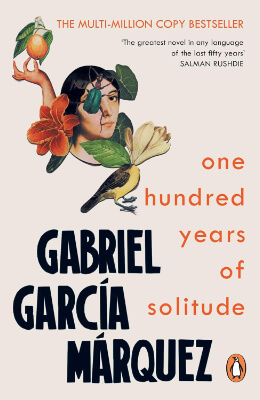Introduction
There are a few books that have been in my to-read list for centuries. Do you also keep such lists? I can tell you, mine is pretty huuuuuge. And not just books. Movies, TV Series, Video Games… And it just keeps growing…
Anyway, One Hundred Years of Solitude has been in my to-read list ever since I became interested in literature, eons ago.
If you are like me and like weird stuff, it is very likely that you already read or at least heard of this book at some point.
If you are also like me, you probably postpone reading your most treasured wish-list items, for when the appropriate occasion presents itself (with me, it tends to never arrive for some reason…).
But you see, I’m one of those people who insist on reading the books before their adaptations make it to the telly. Well, fate wanted Netflix to produce a TV adaptation of One Hundred Years of Solitude, and I knew that I wouldn’t be able to resist when the show appeared in my home-screen – such are the dilemmas of my life! :D.
So, I bit the bullet, bought the book and read it from front to back.
My oh my, what a book!!!
Review
The novel begins with descriptions of the day-to-day life of the Buendia family: José Arcadio Buendía, Úrsula Iguarán and their two sons, José Arcadio Buendía and Aureliano Buendía. The patriarch José Arcadio Buendía founded the city of Macondo, which annually receives the visit of a group of gypsies and their leader Melquíades. This encounter marks the beginning of a strange but pivotal friendship between José Arcadio Buendía and Melquíades, also opening up Macondo to the outside world.
Gradually, the book takes us on a journey through time (seven generations of the Buendía family to be precise), where Macondo sees the introduction of the railroad, the establishment of a foreign-owned plantation company, and experiences tragic events reminiscent of actual historical occurrences (such as the Banana Massacre of 1928 in Colombia).
The book continues telling the story of the misfortunes of the Buendía family, with family members coming and going, some dying, some moving away, most being forgotten…
One Hundred Years of Solitude is no ordinary book… and certainly not the easiest of reads. There is surprisingly little dialogue, paragraphs are dense and long, character names confusingly similar, and weirdness abounds.
Very early on, strange events start to happen, such as the appearance of magical flying carpets, characters rising into the sky, blood running throughout the town with a seemingly will of its own, rainstorms that run uninterrupted for years, a plague that causes insomnia and forgetfulness among the inhabitants of Macondo, and so on… At first, I dismissed these oddities as translation peculiarities or even misunderstandings on my part. However, bizarre events just kept cropping up, with little surprise or astonishment evinced by any of the characters – magical realism at its height!
The eloquence with which Gabriel García Márquez writes, however, is simply phenomenal! His dominion over vocabulary, and the manner he articulates each sentence is masterful.
And that is an important aspect of reviewing books from authors of the caliber and prestige of Gabriel García Márquez. I’ve read my share of Nobel laureates in Literature, and I’ve had my share of disappointments. That wasn’t the case with Márquez though – I did not feel that his writing was pretentious, and it seemed he went to great lengths to turn a dense book into an enjoyable read.
I read the English translation, which was impeccable, but in retrospective, I should have given the original Spanish version a go. Sadly, my level of Spanish isn’t on the level of my English, so I was reluctant to embark on potentially frustrating reading experience, as I expected a fairly complex novel (I bought the Spanish version now, for when I gain the guts to read the book again).
The tone of the book is dark, relentlessly dark, so don’t go in expecting much tonal variation. I recently watched the first episode of the Netflix TV Series, and I think they did a really good job at bringing Macondo to the screen: a desolate and insular town, with rudimentary houses beneath a harsh and torrid heat; a dry, brown and dreamlike landscape; distant, strange and taciturn inhabitants, distrustful of any outside influence. That should give you an idea of the kind of atmosphere you should expect.
The characters are appropriately fleshed out. I actually thought that none of them was very likeable, but in some sense, they were all captivating. It’s clear Márquez did not wish to create clichéd, flat, one-dimensional personalities. And this dynamic is evident across the Buendia generation over the years – no offspring exhibits the same behaviour as their parents. They all have their own (weird) personalities and idiosyncrasies and make different kinds of mistakes. I say “mistakes” because the Buendía family seems to be cursed in making bad decisions – or, if you prefer, terrible at preventing misfortunes.
Now, let’s talk about the slightly more negative notes. If you read the book, one of the issues you will surely have encountered is the confusingly similar names of the Buendía family.
You know, I took the time to check out a few reviews of the novel before reading it myself, and many readers complained about this exact same aspect of the novel…. Condescendingly, I thought “Bahh, work on your working memory people!”. Well, who is laughing now?!?
Very true! No matter how good your working memory is, I guarantee that at some point you will lose track of who is whom. The problem is that the names of the Buendía family are almost identical. Just as an example: José Arcadio Buendía, José Arcadio Buendía (the son), Arcadio, José Arcadio, José Arcadio II, José Arcadio (a different one), Aureliano Buendía, Aureliano José, Aureliano II, Aureliano Babilonia, Aureliano… It’s utterly confusing.
But I understand this was intentional; a literary technique that allowed Márquez to inject a subtle kind of weirdness. Readers begin to conflate characters, their appearance, behaviours and attitudes, creating a mishmash of identities that blurs the line between individual personalities. By the end of the book, I felt that the Buendía family, across all its generations, consisted of almost a ghostly conglomeration of figures, each of which lacking any true individuality.
Whether that is true or not, I must admit that it was a frustrating experience for me though. Sometimes, one member would mention some past character simply by name, and after having read a handful of stories, now all intertwined in my brain, I failed to place the character into a context that would allow me to identify him/her.
So, I just went along and hoped it wouldn’t affect comprehension later. In most cases, it didn’t. In some cases, it did.
The second least positive point is that my motivation to read the book slightly declined towards the end of the novel. The characters’ personalities became shallower, there is less character development, and the stories themselves are less interesting (but perhaps this was intentional as well). Also, remember that the entire novel takes place predominantly in the fictional town of Macondo, so there isn’t a terribly amount of variety.
But when you do reach the end: boom! What an ending…
Not to brag (since it is surely not a skill I desire to possess), but I usually have a decent sense where a story is heading in certain types of books. That wasn’t the case here. Márquez was very careful to introduce key events at just the right moments, with the magical realism perfectly cloaking the deeper truths. But it’s all there from early on. Márquez’s ingenuity in concealing the final revelation catches you completely off-guard – I’m serious, you will never see it coming! (I know this paragraph sounds vague, because I’m trying my best to describe my feelings towards the book without giving you any spoilers. But if you already read the novel then click on the following spoiler: Of course, I’m referring to the prophetic role of Melquíades and his parchments regarding the destruction of the Buendías. Melquíades was “said to possess the keys of Nostradamus” and “who seemed to know what there was on the other side of things.”. Márquez even explicitly writes that Melquíades “had found a prediction of the future of Macondo. It was to be a luminous city with great glass houses where there was no trace remaining of the race of the Buendías”.
Right there, before my eyes, and I completely missed it! How embarrassing…
Star rating
I waited more than 20 years to read the novel that was probably THE novel any surrealist lover should read in their lives. It certainly didn’t disappoint. It was by far one of the best books I have read in the last decade, so, by all means, give this novel a try!
But, remember, don’t go into the book expecting a clear-cut and logical plot. Most characters behave very strangely and over the top, perfectly in tune with the book’s magical realism, where weird happenings go unaccounted for. Patience and perseverance are definitely a must, but you will be rewarded for the effort. One Hundred years of solitude is superbly written, and the separate stories of the Buendía family, even though bizarre, are engaging and unified.
I’m not giving it 5 full stars, because engagement declined towards the end. In my opinion, the first half of the novel was clearly superior to the second half (but the ending was spectacular), and, honestly, I got a bit fed up with the overlapping and confusing names. But these are two minor points really, because One Hundred Years of Solitude should be in your wish-list.
Please, don’t postpone it (like I did) – read it now!
Here at Mindlybiz, One Hundred Years of Solitude gets a star rating of 4.5 stars!
Bizarrometer
Hhmm, this one is tough. There is a grading degree of bizarreness in One Hundred Years of Solitude. The initial chapters do not offer many extremely bizarre moments, but it gets exponentially weirder as you read through.
It’s really hard to describe… It’s as if the weirdness from past chapters remains with you such that you can’t simply turn away from it.
You see, if a book is surreal from beginning to end and very little makes sense, you sort of get used to it and just take the weirdness for granted.
However, bizarreness in One Hundred Years of Solitude is of a different kind. Macondo could almost pass for some countryside town in your own country, with inhabitants simply trying to make ends meet.
But little-by-little, characters begin evincing behaviour that makes you go: WTF! They hardly question paranormal phenomenon, going about their lives as though nothing strange had happened.
So, you know something is off, and this feeling doesn’t go away as you keep reading. Because the story looks mundane, you expect this strangeness to be accounted for. But it never is… It just lingers in the background; one moment, you’re in a familiar, down-to-earth world, in another you’re spiraling into the surreal.
One Hundred Years of Solitude gets a score of 3.5 in the Bizarrometer.





Leave a comment
Add Your Recommendations
Popular Tags